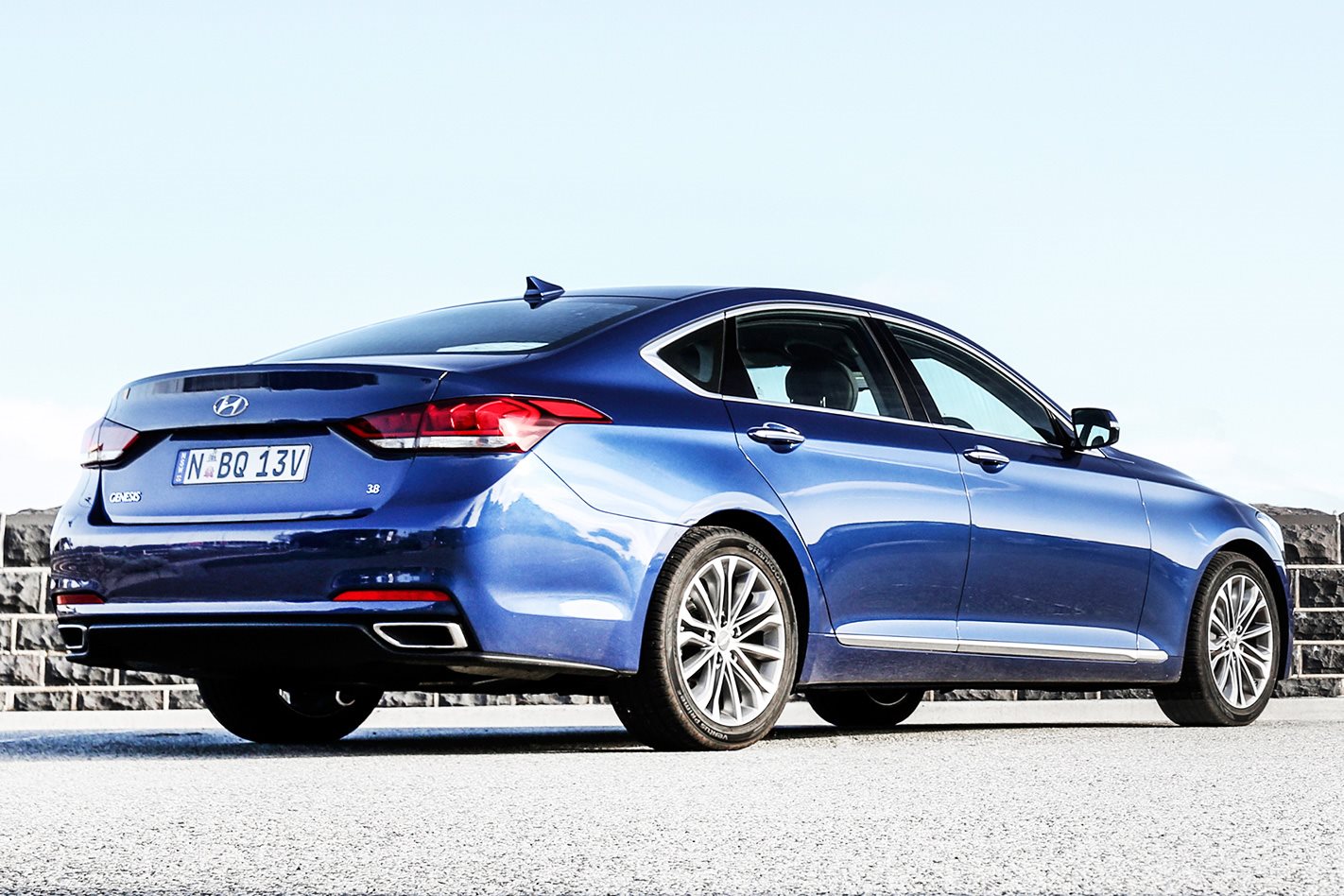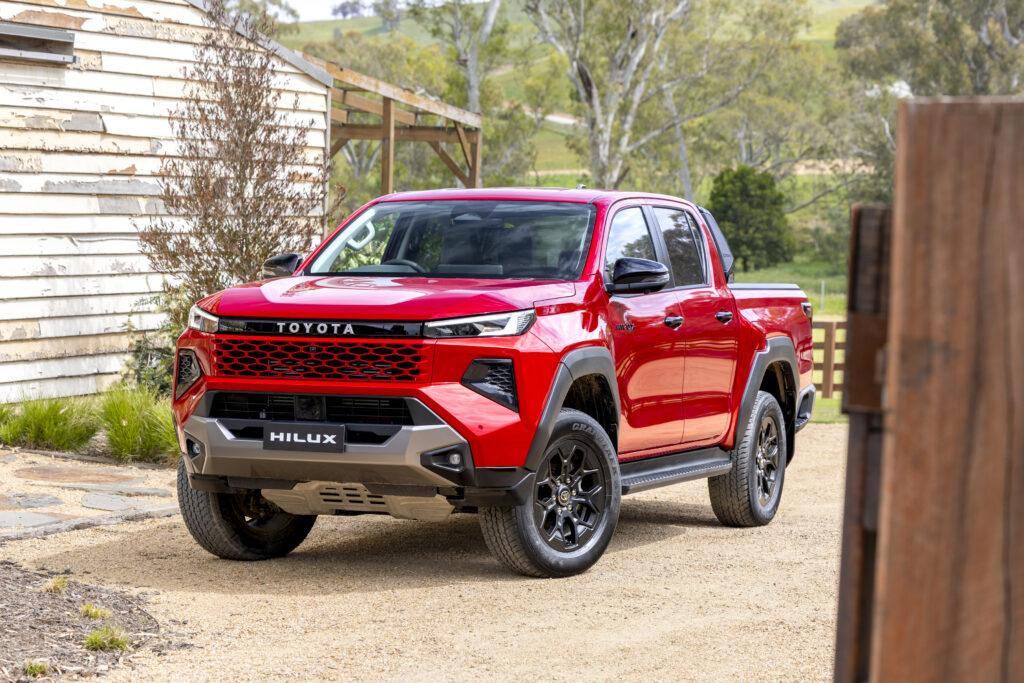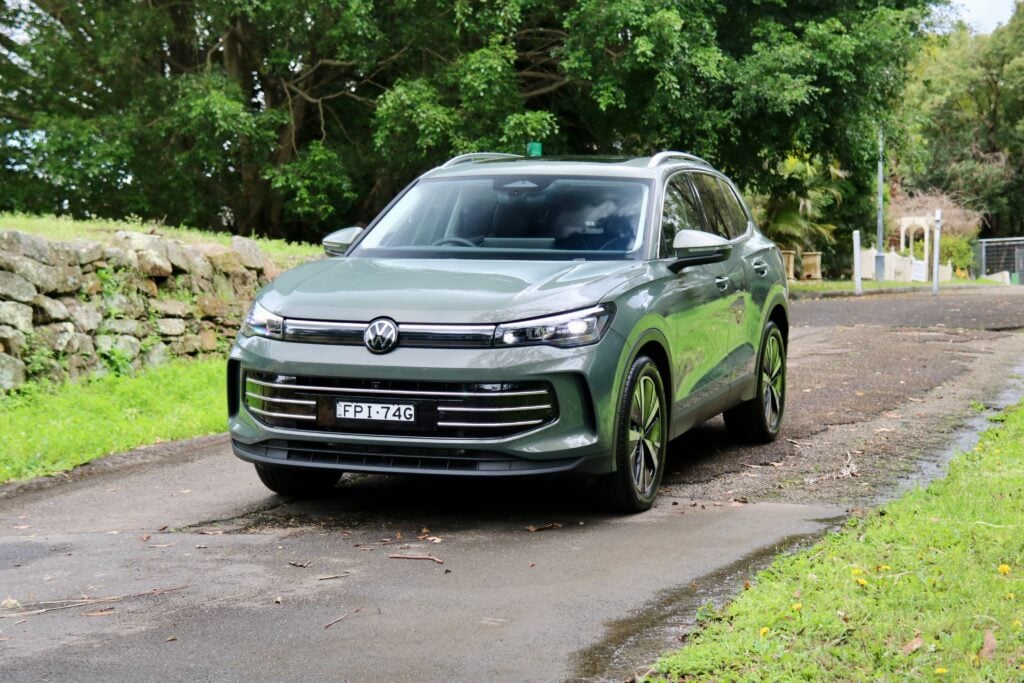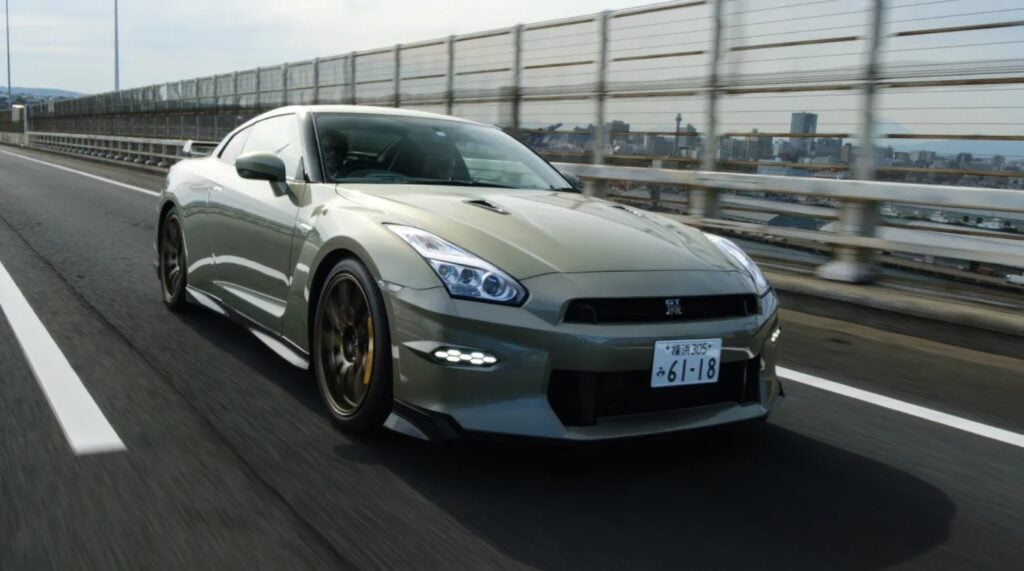- Part One: Somebody’s Watching
- Part Two: Heir Apparent?
- Part Three: Hanging Tough
- Part Four: Honest Labour
Part One: Somebody’s Watching
THREE weeks in and I’m paranoid. People really are watching me.
I loaned my new Hyundai Genesis long-termer to our writer Damion Smy for a few days, and the first thing he remarked on was how people stare as it glides by. We’ve both driven cars that attract attention, but they’re usually loud sports cars or Italian supercars. Not Hyundais. It’s never been Hyundais… until now.
So I’m not imagining things. The Genesis is a head-turner.
I don’t think it’s particularly alluring, though the styling is cohesive and premium, and the sedan’s stance is strong. Some COTY judges last year felt the Genesis could easily be mistaken for an Aston Martin sedan.
The grille does mimic the Rapide a little, and there’s that winged badge, but otherwise it’s a stretch in my eyes.
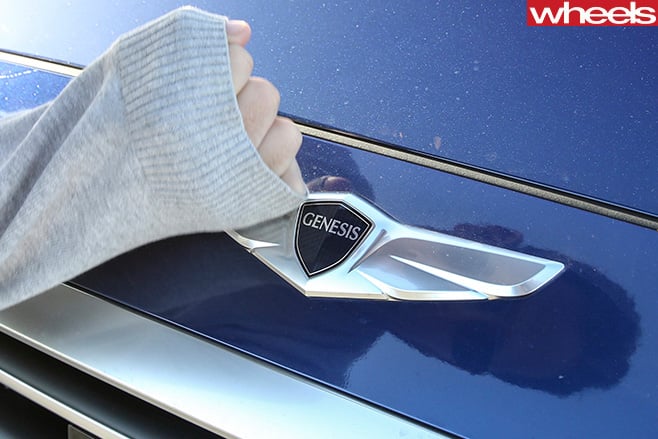
Further investigation required, of the vox pop nature. Stay tuned.
So far it’s been a serene and high-mileage first few weeks. The Genesis’s overall refinement is excellent. The cabin is quiet, the ride isolating, and the drivetrain’s effects are seen but not heard.
The multi-adjustable electric seat is comfortable and, combined with reach and tilt steering adjustment, delivers the driving position I want.
I haven’t explored its dynamic limits yet, but already the benefits of Hyundai’s localisation program can be felt. The suspension absorbs sharp edges and bumps without feeling floaty or overly soft.
Initial turn-in is impressive for a 5m car with a 3m wheelbase weighing almost two tonnes. There’s no overt sense that it’s leaning on the outside front or that body roll is softening its bite.
Getting started each day is not without its little quirks, though. Even after dozens of journeys, for the life of me, I can’t remember whether to push or pull the park brake switch.
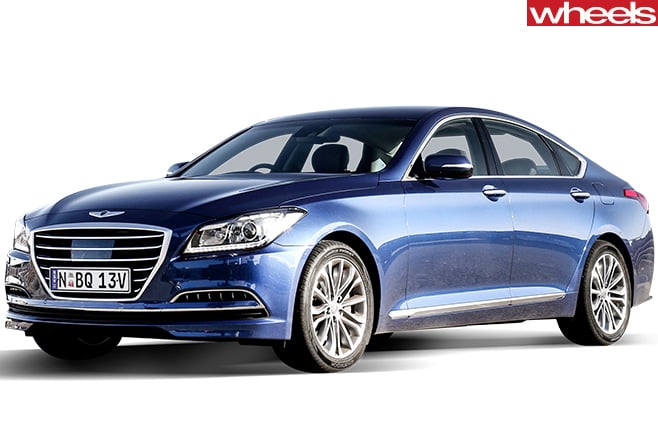
I don’t like start buttons hidden behind steering wheels, and the gear selector’s detent makes a plasticky clunk each time it moves out of Drive.
That gear lever clunk was quickly fixed by a Hyundai service rep, and though it seems such a little thing, it’s why prestige car companies spend millions on finessing haptic feedback.
I’ve not messed around with the drivetrain’s Eco mode, or its Sport alter-ego yet, which I suspect may help the slick eight-speed transmission make better use of its ratios.
I’m deliberately spending time getting familiar with the baseline first.
We started our days together during a Melbourne winter. This $60K base model wears 18-inch Hankook Ventus Primes – the top-level $80K Genesis gets 19-inch Dunlops – and they’re generally fine.
But they do have a weakness when it comes to standing-start turns on wet roads.
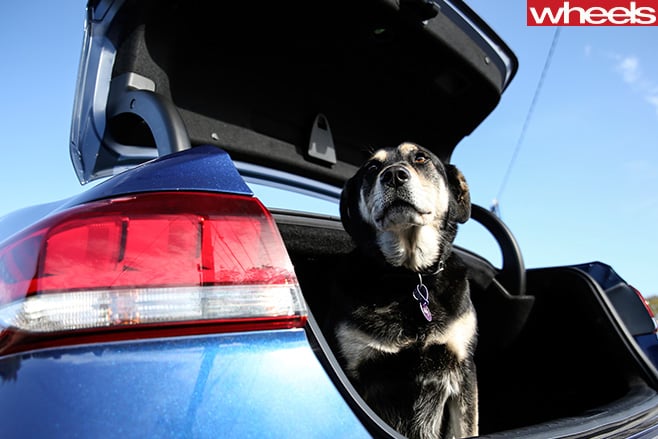
It shows little finesse with its response, though, cutting drive completely until well after traction is restored. If you’re attempting to merge with traffic, this accelerative pause can feel like ages.
I’ve learned to be more judicious moving off in the wet, but I wasn’t exactly stomping the throttle before because I’m trying to get a good fuel figure, as 12.7L/100km for a month of commuting proves.
Still, if it’s a choice between overzealous or inattentive ESC, I’d take the former.
Otherwise, it’s been a serene first few weeks. Yep, serene. I’ve noticed a marked improvement in my ability to tolerate the morning commute.
Spending a few extra minutes in its quality confines is no hardship. Now, if I can just get the boss to approve a chauffeur, I’ll set about testing the back seat properly.
Social climber but still a value proposition
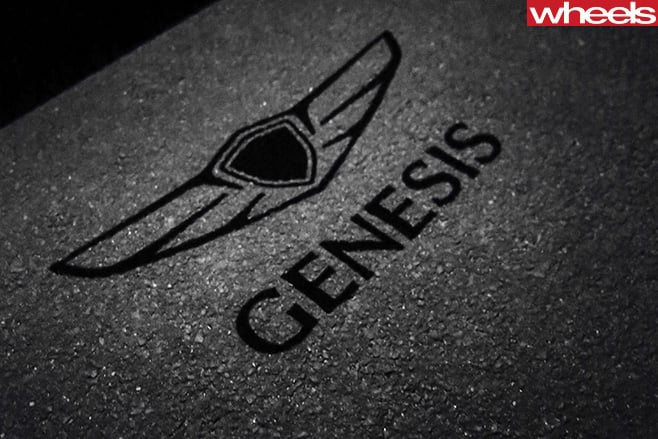
Radar cruise control gets a regular workout, as do the front and rear parking sensors, though the front ones sometimes don’t pick up the single central bollard located outside my favourite coffee stop.
Other driver-assist systems include lane departure warning and auto emergency braking, which thankfully I haven’t had cause to trigger yet. Puddle lights that include the Genesis logo (far left) are a nice touch.
And the Smart Boot, which opens when it senses a person waiting behind it with the key, is clever, and much better than having to wave your foot wildly under the bumper like some other systems.
Hyundai Genesis Price as tested: $60,000 Part 1: 1553km @ 12.7L/100km Overall: 1553km @ 12.7L/100km Odometer: 1655km Date acquired: June 2015
Part Two: Heir Apparent?
THE supposedly Chinese curse ‘may you live in interesting times’ is probably not Chinese at all, but from my spot in the editor’s chair of Street Machine magazine, it has a certain ring to it.
SM has, for 35 years, celebrated big Aussie rear-drive cars, but that era is about to end. As a magazine, we’ll be fine, but what the heck are right-thinking folks (that is, those who enjoy big cars, with large donks and rear-drive) going to do for daily transport when the ‘proper’ Commodore and Falcon are no more?
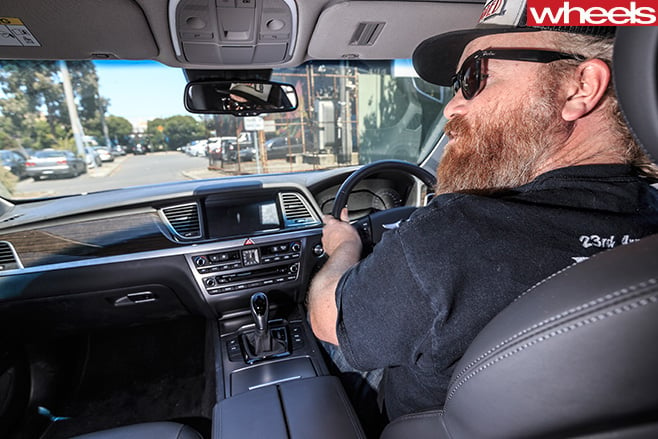
I didn’t give it much thought, assuming that the big, blue sedan was an Aston Martin and therefore not worthy of notice. It wasn’t until Butler threw me the keys to the Genesis that I realised the blue car was of Korean, rather than English, extraction. Never mind; I needed wheels for a quick mission to Canberra, so I was happy to take something capable and practical.
The newest vehicle in our household was made in 1963, so when I do try my hand at a modern ride, I have a few basic yardsticks. The first is that I can get in, start the car, turn on the radio and crank up the Bluetooth without needing an engineering degree or the assistance of a 12-year-old. Tick.
And everything I’m interested in using – radar cruise, stereo, sat-nav – are intuitive to operate in the Genesis. Push-button handbrakes are a pet hate of mine, but otherwise, the Genesis is entirely beaut – acres of legroom front and back, no discernible handling vices, a plush ride and enough stonk for the job. Fuel economy would be of no concern to anyone buying this type of car.
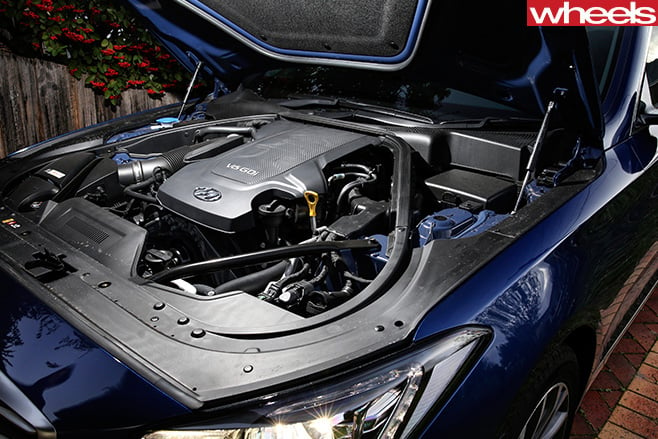
So, on a purely rational basis, the Genesis seems a fine alternative to a Calais, Statesman, 300 or Fairlane (RIP), though it would, of course, be much better with the V8 available in other markets. However, few people buy cars for rational reasons. Whether the Genesis can overcome the handicap of the Hyundai badge remains to be seen.
The street machiners in Canberra were surprised to learn my ride was a Hyundai and thought it looked pretty tough. In the main, our constituency is either sad or angry at the end of local car production.
The Genesis may be attractive to those who don’t like the wank factor or the servicing and repair costs associated with the European alternatives. It might even be a cult hit if Hyundai Oz gets the V8 happening.
Inspect the gadgets
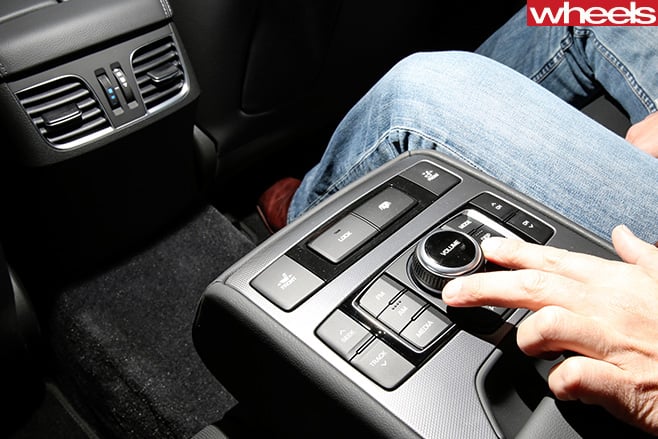
The Genesis comes up trumps here, with the electric rear shade eliciting oohs and aahs from my passengers; the courtesy puddle lights from the exterior mirrors; the adjustable radar cruise control (not as flash as the BMW version, for instance, but pretty good); and the beaut magic boot that pops open on approach. It needs proper fold-down rear seats, though.
Hyundai Genesis Price as tested: $60,000 Part 3: 3220km @ 12.0L/100km Overall: 6263km @ 12.2L/100km Odometer: 6463km Date acquired: June 2015
Part Three: Hanging Tough
I CAME close to losing the Genesis this month. Took some time off and left the car with publisher Bulmer. He took an immediate liking to the big Korean, his attachment growing stronger as the days went on.
He liked the refinement – who doesn’t – and was equally appreciative of its ability to move the brood in comfort. Plenty of boot space for all their luggage for a week away, and enough backseat legroom so that the Bulmer-ettes couldn’t kick mum and dad’s seats.
So when I returned he said the Genesis’s quality and refinement was wasted on me. He should take over the long-term test. I was torn. I like my job, so best not get the boss offside, right?
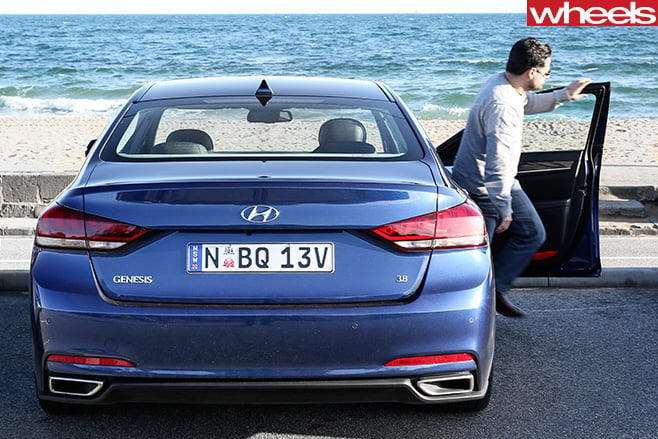
There are its overt charms, like the plush elegance of its interior fit-out. And then there are the more subtle charms that make me smile each time I notice one. Like the Genesis logo in the puddle lights. And the indirect interior lighting.
And how the boot opens when it senses you approaching, arms laden. And the rear power blind, which does me little good in the front, but wows my back-seat passengers.
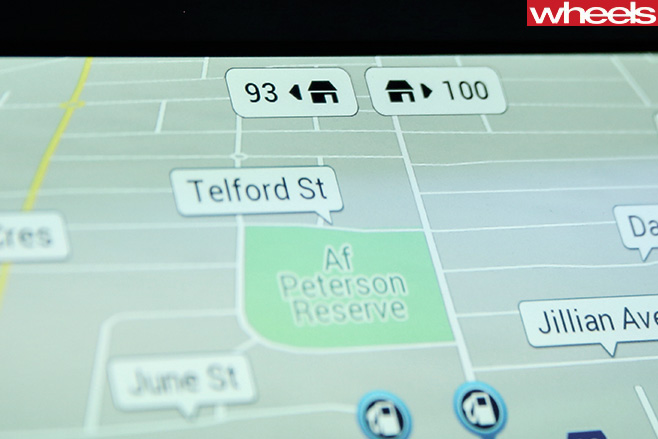
And the stereo. I’m surprised just how important a good sound system is to me. Yes, I primarily listen to AM radio, especially the SEN sports network (which should stop pretending and just rename itself AFL radio).
Every now and then I like my Bluetooth tunes, and it’s good to know the Genesis’s Lexicon 17-speaker sound system can faithfully reproduce every sweet note of a Stevie Ray Vaughan solo, and do Muddy Waters’ swamp-bottom baritone justice.
Also, I’d only just begun to explore the drivetrain’s more lively Sport mode. You’ll recall that for our first month together, I left it in Normal. Sport brings a noticeable attitude change to the transmission.
It’s less eager to change up through the gears as it moves off, which may increase fuel consumption, but is much better for my accelerative expectations. The drivetrain’s generosity should match with the car’s premium positioning, right?
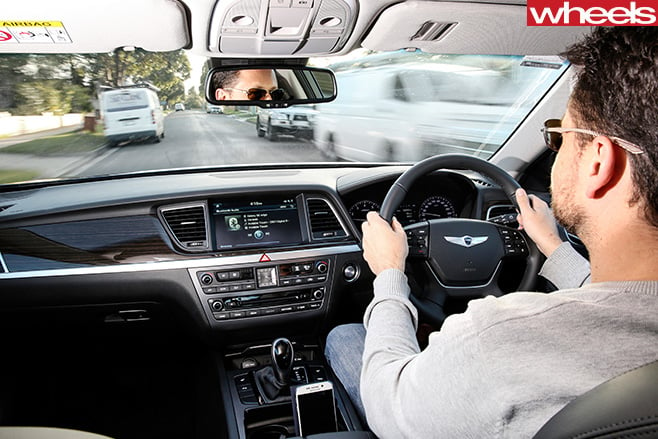
As they say, adversity breeds innovation. I needed to distract the boss with an even brighter bauble. So I mentioned that his theft of the Genesis would force me into the new and very interesting Volvo XC90, a family SUV that even hard-nose Carey has been raving about.
What’s the point of a bloke with no kids testing that, I pondered aloud as I left his office. Ged came into my office later that day. He said he had an idea…
Unwelcome penetration
JUST before I headed off on leave, the Genesis developed a slow puncture in the left rear. Turns out the tyre got screwed, literally. One through a tread channel, which would have been pluggable (and therefore cheap to remedy); the other pierced the sidewall, so no repair was possible.
Given the property development going on around my area, it’s easy to guess where they came from. Bulmer, obviously thinking this car would remain his when I returned, spent $279 having it replaced. Thanks, boss.
Read part 1 of our Hyundai Genesis long-term car review.
Hyundai Genesis Price as tested: $60,000 Part 2: 1690km @ 12.3L/100km Overall: 3243km @ 12.5L/100km Odometer: 3345km Date acquired: June 2015
Part Four: Honest Labour
MELBOURNE rain sucks. Just one night after I washed Big Blue for the third time in our four months together, it rained. And Melbourne’s rain is not just drops of water like rain is meant to be. No, each drop carries a load of Mallee dirt. When the rain stops and the car finally dries, every panel is peppered as though I parked too close to the speedway.
The Genesis’s classy blue paint has one big drawback. It contrasts with this Mallee dirt. White doesn’t, nor does grey or beige, which may be why more than half of all new cars bought by Australians are shades of those colours.
Watching the sea of conservative colours flowing down Aussie roads makes the reds, yellows and blues stick out like jelly beans in a bowl of pistachios.
So I washed Big Blue twice in three days. Scrubbed its big panels again, then chamoised them down so it didn’t streak, again. I had to. I wanted to drive around in a clean car. At least I didn’t have to get the vacuum cleaner out and go over the insides again.
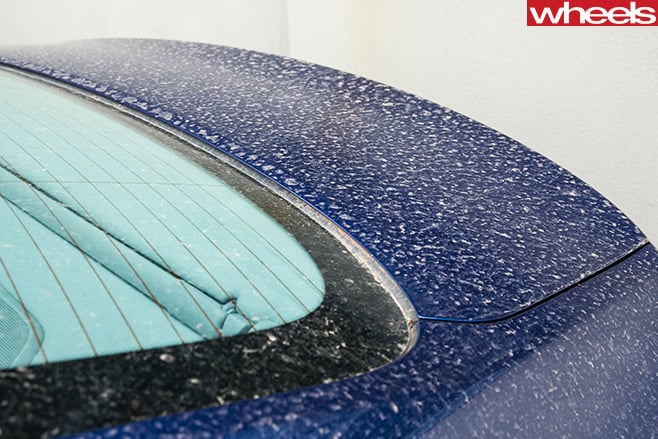
There is an exception to the clean-is-king rule, though. Hard-earned road grime; you know, the kind that covers a car after you’ve done a big journey. Bugs splattered all over the front, road muck fanned out behind each wheel, and that dull covering of dust on the rear.
To me, that makes a car feel tougher and more resilient. That’s honest dirt, like sweat after a day of physical labour.
I took one of those honest drives after I cleaned the Genesis again. Went out to Launching Place and then down through Powelltown to Noojee. It’s a great winding road through tall timber, and doesn’t get half the tourist traffic that plagues the Dandenongs.
Then I aimed south to Moe and all the way down to Foster.
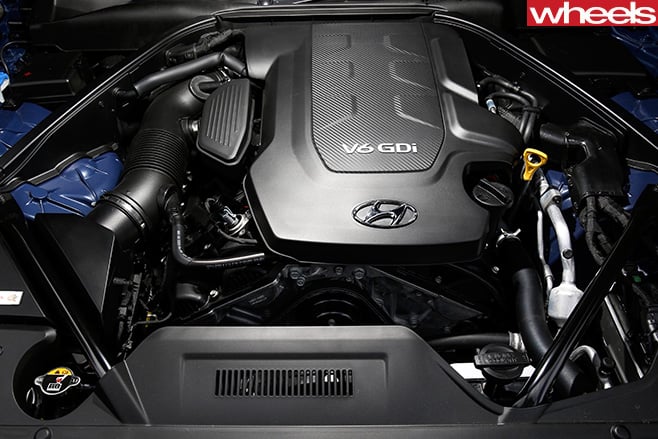
The Genesis doesn’t have the nimbleness of a Commodore or Falcon. It’s still quick and has plenty of grip, but it’s just not as engaging. And forget about provoking the rear. A comfort-focused suspension tune and no ESC switch means the rear is a follower, not a fighter.
The Genesis is a Statesman rival. We should do a comparo before Big Blue goes back. It’s a pity there’s no Ford Fairlane anymore, but maybe we should throw a couple of left-field rivals to benchmark the Genesis in other areas. An Audi A6 for interior and dynamic refinement perhaps, and a new Lexus GS for space and value.
But first I’ll need to wash the Genesis again. And all those bugs are going to take some scrubbing.
Country consumption
The old-school 3.8-litre V6 (pictured above) likes long open roads more than stop-start urban commuting. Big country miles don’t tax the transmission’s easily confused gear-change logic much, and they let the big V6 show the benefits of having peak torque from 2000-6000rpm.
This month’s long Sunday drive returned an impressive 9.9L/100km for the 400km round trip, despite plenty of hills and a decent average speed, almost 30 percent better than the 12.8 I’d been averaging for the working week.
Hyundai Genesis Price as tested: $60,000 Part 4: 1026km @ 11.5L/100km Overall: 7289km @ 12.0L/100km Odometer: 7489km Date acquired: June 2015
Part Five: Hail Fellow Well Met
SAFETY is great, as long as it’s not inconvenient. My dog, for example, finds the in-car harness inconvenient to her desire to keep a constant watch out both sides of the car. But if we had to stop suddenly, 24kg of airborne labrador-cross breaking my neck would inconvenience me. And since I’m the boss, I win.
The blind spot caused by the Genesis’s thick A-pillar and generous wing mirror is an inconvenience when turning right, and when parking. But if it had skinny A-pillars instead, I’d grumble a lot more should we find ourselves inverted in a crash, my head mashed down to my navel because the roof caved in.
And I can only imagine how many parking bingles and lane-changing disasters could have befallen us if the Genesis had no wing mirrors.
Those two safety features are mildly inconvenient, but justifiable, and it’s not like I have options. It’s also not like the Genesis is alone in having an obstructive A-pillar. Volvo has even experimented with see-through A-pillars on concepts. Bring ’em on, I say.
Until then, I’ll suffer the inconvenience to keep my head above my shoulders.
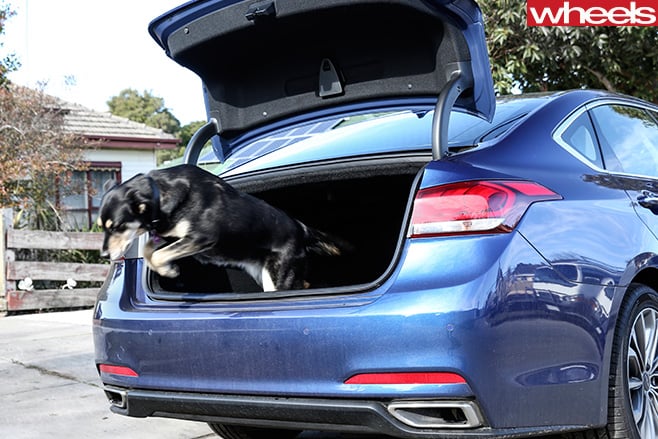
As for the rest of the Genesis, well, I’ve found it all incredibly convenient in our six months together. Almost to the point of transparency. This is a competent and well-sorted prestige sedan, with no real weaknesses beyond the drivetrain’s economy and sometimes lazy transmission. The Genesis is a great first offering from a sub-brand on the verge of its independence.
Hyundai could have grabbed more attention for Genesis if it had debuted groundbreaking technology or bold product innovation, but that could have undermined the ultimately solid foundation this comfortable, conservative and competent executive express has laid down for future Genesis models to build on.
In terms of styling, Hyundai did push the envelope, though thankfully Sydney-born Casey Hyun’s design team stopped short of going too far… like Lexus has. The car’s exterior design shows restraint and exudes elegance, though it does little to disguise the big sedan’s size.
It continues to turn heads, six months into our life together and 18 months after it arrived in Australia.
It’s the same story inside. The cabin is smart and functional, but without any conversation-piece gadgets or gizmos, like omnipotent iDrive controllers or the ability to read hand-waving gestures like in some BMWs.
But it’s all eminently useful, especially the various cubbies and containers for phones, keys and the like.
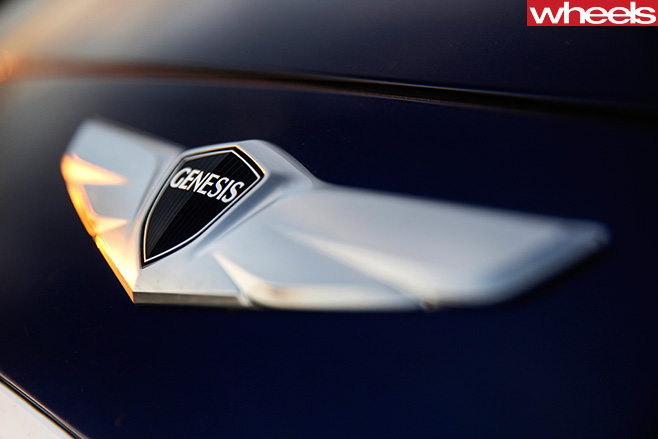
No, the Hyundai Genesis sedan – soon to be renamed the Genesis G80 (without the Hyundai badge) – is now firmly entrenched in my mind as a beacon for even better things ahead.
In decades to come few may remember this honest origin of the Genesis species because, as I’ve said, it’s not remarkable in any particular area. Overall, though, it is remarkable. It’s proof that the once cut-price Korean brand can stretch into the premium domain dominated by the Germans and not look out of place.
Men for all reasons
Albert Biermann, Manfred Fitzgerald and Luc Donkerwolcke are a big part of why I’m excited about the future for Hyundai and its Genesis premium brand offshoot. Those three gentlemen have been poached from European prestige marques Audi, BMW and Lamborghini to design and engineer the cars tasked with catapulting Genesis into the big league of luxury and performance.
Biermann, in particular, is an interesting acquisition, fresh from a stint as head of BMW M. For me, that’s a double-edged sword. BMW M has turned out many great driving cars, but in recent years its turbocharged offerings have lost their way a little.
Guess we’ll have to wait and see which direction Hyundai’s newly created N Performance brand takes.
Hyundai Genesis Price as tested: $60,000 Part 4: 1272km @ 11.1L/100km Overall: 8561km @ 11.8L/100km Odometer: 8761km Date acquired: June 2015

